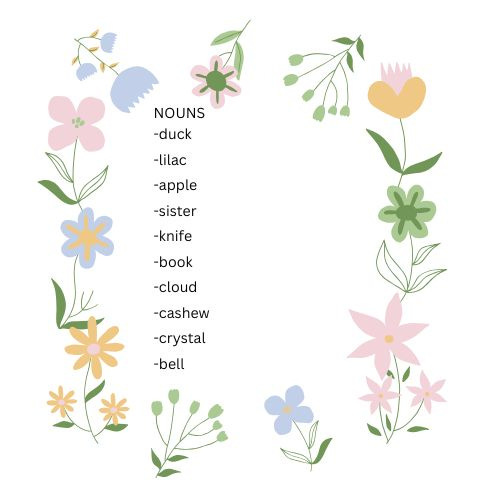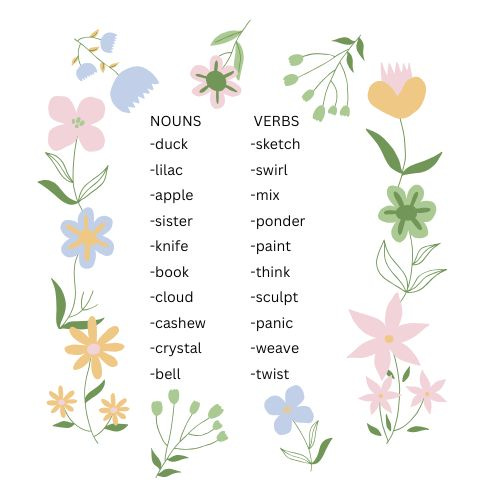Turn the Soil, Invite the Worms
What to do when inspiration and ideas run dry (OR, an excess of plant metaphors because I'm desperate for spring)
Imagine a garden in the haze of mid-summer. Blueberries hang heavy in clusters, weighing branches down. Sun-warmed cherry tomatoes burst with tangy sweetness. Mint crushes underfoot, its sharp scent cascading over the ground.
When your creative garden is overflowing, it feels like all you have to do is wander through the rows and pluck the ripest ideas, roll them gently between your palms and then set them down on paper. This is the miraculous stage of writing where you gleefully juggle multiple WIPs and follow plot bunnies with insatiable curiosity. Where characters stay up all night talking to you and worlds appear in your subconscious, full and detailed and eager to show themselves off to you.
Now picture a garden where all those ripe crops have been harvested. The left-behind stems are curling and dry. The dirt, dusty and depleted. Just like a real garden, if you don’t put anything back into the earth, it becomes barren. Scraped over. And if that garden is also then beset with hailstorms and drought and pests that creep inexorably from the shadows to consume every last bit of green goodness? It can be hard to imagine anything growing from that ground again.
It’s been a while since Inksmithing’s last newsletter, and a big part of that is *gestures broadly* the state of the world. We’re inundated with the news, with scandals, with inventive and fresh horrors just about every day. If you’re managing to stay even marginally sane and compassionate right now, you have my most heartfelt congratulations and support. I’ve been doing what I can to support my local community charities, and recently volunteered to be part of the editorial board of Clarion Magazine, where I get to help bring feral and fiery poetry into the world. And all that helps to keep me functioning in the face of everything, but when it comes to getting actual words down, it’s been more challenging.
Even in largely uneventful times, everyone has their own creative drains. Your kids get sick, your job becomes all-consuming, your brain chemistry turns belligerent. Often, the treatment is simply to get some rest and be kind to yourself. But if you’ve checked off your self-care boxes to the best of your ability and you’re still wordless, doing some no-pressure writing exercises can help to lay down some fertilizer so that ideas can start taking root again. Below are three of my favourite exercises—used many times over in my writing workshops with great success—whose only purpose is to help you get words on the page.
Pick a colour and make a list. This one is as simple as it sounds. Pick a colour—green, for example—and start listing things that you associate with it. Start with the easy or obvious ones (grass, kiwis, envy, money) to get your pen moving. Then, lean into a freewriting approach. I like to encourage slant thinking with this exercise. Try to include all your senses. Go beyond just the visual and think of things that sound green, or taste green, or feel green.
The sour tang of an underripe kiwi that curls the edge of your tongue, the whisper of a summer wind through birch leaves in June, the dusty green of mold creeping over a forgotten end scab of bread, the obnoxious rumble of a lawnmower just after sunrise, the blurred edges of a fading bruise.
From Natalie Goldberg’s Writing Down the Bones, this one is a little more involved. First, write a list of ten nouns on the left side of your paper. Use the first ten that come to mind; these don’t need to be complex or particularly interesting.
Next, pick a profession and write down ten verbs you could associate with that profession on the right side of the page. For this example, I chose artist. (Goldberg suggests writing fifteen verbs, but I cheated in this instance.) Feel free to get creative with your verbs.
Now, mix and match to create sentences. Again, these don’t have any purpose beyond getting you to think in new ways, but also, if one of them opens a door to a scene or a character, consider this your permission to follow it wherever it leads. Some of them may be terrible—which is okay and expected!—but the odd one may be interesting and novel.
The small pile of books wove an air of danger in the study.
The knife sculpted his flesh.
The duck sketched out ripples over the pond at sunset.
Clouds pondered the star-laden sky.
And finally, one of the easiest ways to get your pen moving is to borrow words from another writer as a seed crop. Personally, I love borrowing from poets for this exercise because poetry is already so dense with meaning and subtext and sensory details. Start by writing the line at the top of the page and then give yourself five or ten minutes to freewrite whatever wants to come next, whether that’s a poem, a string of dialogue, a description, or an abstract stream of consciousness.
“…all I ever wanted was to be of wildflowers…” - Joy Sullivan
“…there was a beehive here inside my heart…” - Antonio Machado
“Every leaf that falls never stops falling.” - Victoria Chang
“You can keep your sapling body; I want to be a mountain.” - L.E. Bowman
“…we are like the pages of a love letter written thirty years ago…” - Ellen Bass
If you try any of these exercises, I’d love to hear from you. And in the interest of fostering an encouraging writing community in the face of *everything*, I’d love to offer a free zoom writing workshop sometime in April where we go through a few exercises together and share our writing in a supportive environment. Comment or message me if you’re interested, and I’ll start brainstorming some times/dates.
I hope you’re all staying safe, supporting your loved ones, and doing what you can to put kindness out into the world.







I loved this piece and the bonus of the writing exercises. Thanks for sharing much.